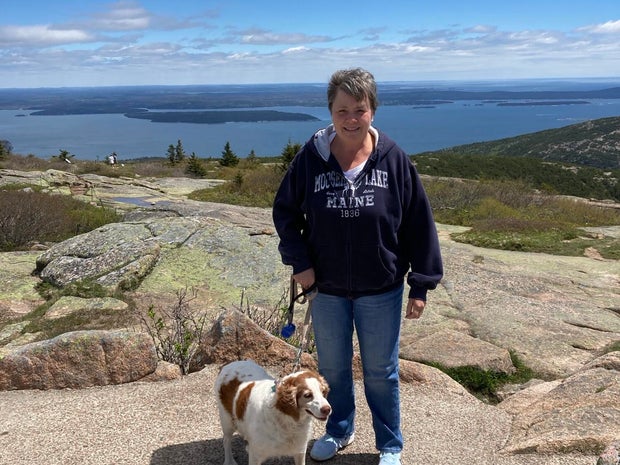Diane Davis thought a diagnosis of advanced ovarian cancer was the answer she had been looking for.
For months, she had been sick. Antibiotics were no help. When she went to the emergency room, a CT scan and MRI showed no definitive answers. She bounced from specialist to specialist. A colonoscopy showed nothing. All the while, Davis had lower back pain and was so nauseous she could barely eat.
“I just got sicker and sicker,” she said.
In January 2017, she found herself in the office of Dr. Christopher Darus, a gynecologic oncologist at MaineHealth Maine Medical Center. He was concerned by the multiple cases of cancer in her family history. He scheduled her for exploratory surgery for the next day and found a softball-sized ovarian tumor that had spread to other organs. At last, Davis knew what she was facing.
“It was devastating, obviously, but I was relieved too, because at least now we knew,” Davis said.
Darus, who removed the mass during the surgery, outlined a plan to treat the advanced ovarian cancer. Next would be chemotherapy. But after three cycles of chemo, Darus found a new mass growing in her pelvis.
It’s “extremely rare, extremely ominous” for ovarian cancer to return that quickly, Darus said. Generally, women whose cancer does not return within six months have a better prognosis. Those whose cancer recurs faster typically “live less than two years,” Darus explained. To make matters worse, Davis’ cancer had also spread to her lymph nodes.
“I did not expect, halfway through chemotherapy, to be in a worse situation than I was when I was first diagnosed,” Davis said.
Diane Davis
“Like a ping-pong ball”
Darus submitted Davis’ tumor for molecular testing, which identified unique biomarkers and led to her diagnosis with a condition called Lynch syndrome. The condition is “essentially a cancer syndrome,” said Dr. Paul Oberstein, a medical oncologist at NYU Langone who studies it. A person with Lynch syndrome is more susceptible to different forms of cancer, including ovarian cancer. The diagnosis gave context to the Davis family’s cancer history and opened the door for more treatment options.
There are at least four proteins that can be involved in Lynch syndrome, Darus said. The proteins typically help repair DNA. If one or more proteins are missing, as they are in Lynch patients, mistakes in the cells can accumulate, Darus said. That “is like having a messy room” to the immune system: The body knows something is wrong and immune cells will migrate to the area, Darus said. But the cancer can turn off those immune cells, so the body doesn’t respond appropriately and the cancer begins to form. The tumors that arise in Lynch syndrome may have 50, 100 or more mutations, Oberstein said.
That large number of mutations makes it easier for a person’s immune system to respond to the tumor, Oberstein said. Using immunotherapy to activate a Lynch syndrome patient’s immune system against those cancer cells can lead to positive outcomes in many cases, he said, though no treatment works for everyone.
With few options, Darus started looking at drugs called checkpoint inhibitors, which “unmask” tumors and allow the immune system to attack cancer cells. After the Food and Drug Administration approved a drug called pembrolizumab for some patients in June 2017, he was able to prescribe it to Davis. She received the immunotherapy treatment every three weeks.
Within two treatments, the new mass in Davis’ pelvis was gone, and the cancer on her lymph nodes was receding.
“It was kind of like a ping-pong ball: You get diagnosed, and then you get sick again, and then having the immunotherapy just swung me right back to feeling good,” Davis said.
Diane Davis
Finding new hope
Davis’ Lynch syndrome diagnosis changed her family. Lynch syndrome is genetic, with about a 50% chance of it being passed from parent to child.
Davis was the first in her family to be diagnosed with it, but her family has traced it back to her paternal grandfather. Her father and uncle, who both passed away from cancer in their 60s, likely had it. Davis’ brother and two sisters were also diagnosed with the condition.
She encouraged her children to get a screener for it. Her son tested negative, but her daughter was positive. She immediately started early cancer screenings. A colonoscopy when Davis’ daughter was 29, more than a decade earlier than most people begin receiving such tests, found a “very, very large precancerous polyp.” It was removed without complication, Davis said. Today, her daughter remains in good health.
“At 29 years old, she would not have had that screenings until she had much more serious symptoms,” Davis said. “So it’s been really good in that respect.”
Davis stayed on the immunotherapy treatment for two years. Six years later, she is still healthy and thriving, with her cancer in complete remission. She still gets regular scans and is at higher risk of being diagnosed with other forms of cancer. Instead of dwelling on what the future may hold, she focuses on her grandkids, who visit often for activities like hiking and snowmobiling.
“It’s been amazing. It’s getting further and further in the distance, which is really strange, because when the chemotherapy failed, I pretty much thought, ‘This is it.’ I didn’t think the future looked very promising at that moment. I thought I had maybe six months, given the speed at which the cancer grew,” Davis said. “But it was amazing. It was really, really amazing.”
